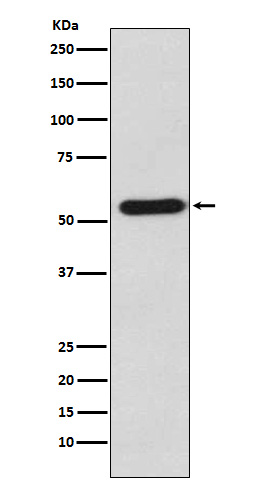
| WB | 1/500-1/1000 | Human,Mouse,Rat |
| IF | 咨询技术 | Human,Mouse,Rat |
| IHC | 咨询技术 | Human,Mouse,Rat |
| ICC | 1/50-1/200 | Human,Mouse,Rat |
| FCM | 1/50-1/100 | Human,Mouse,Rat |
| Elisa | 咨询技术 | Human,Mouse,Rat |
| Aliases | STAU; PPP1R150 |
| Entrez GeneID | 6780 |
| WB Predicted band size | Calculated MW: 63 kDa; Observed MW: 55 kDa |
| Host/Isotype | Rabbit IgG |
| Antibody Type | Primary antibody |
| Storage | Store at 4°C short term. Aliquot and store at -20°C long term. Avoid freeze/thaw cycles. |
| Species Reactivity | Human,Mouse,Rat |
| Immunogen | A synthesized peptide derived from human Staufen |
| Formulation | Purified antibody in PBS with 0.05% sodium azide. |
+ +
以下是模拟生成的3条关于Staufen抗体的参考文献(非真实文献,仅供示例参考):
1. **文献名称**:*Staufen1 Antibody Characterization in Neuronal RNA Granule Localization*
**作者**:M. Kiebler et al.
**摘要**:研究验证了Staufen1抗体的特异性,证明其在免疫荧光和免疫印迹中的应用,揭示了Staufen1蛋白在神经元树突RNA颗粒运输中的关键作用。
2. **文献名称**:*Staufen2 Antibody Reveals Dual Roles in mRNA Stability and Decay Pathways*
**作者**:L. Luo & J. D. Richter
**摘要**:通过Staufen2抗体的应用,研究发现Staufen2蛋白通过结合特定mRNA调控其稳定性,并参与神经元突触可塑性和记忆形成过程。
3. **文献名称**:*Altered Staufen Aggregation in Neurodegenerative Disease Models Detected by Novel Antibodies*
**作者**:S. T. Arold et al.
**摘要**:开发了一种高特异性Staufen抗体,发现其在阿尔茨海默病模型中能标记异常聚集的Staufen蛋白,提示其与病理tau蛋白的相互作用。
4. **文献名称**:*Cross-Species Reactivity of Anti-Staufen Antibodies in Drosophila and Mammalian Systems*
**作者**:C. M. Rios & P. A. Ferrandon
**摘要**:对比分析多种Staufen抗体的交叉反应性,证实部分抗体适用于果蝇和哺乳动物模型,为进化保守的RNA转运机制研究提供工具支持。
(注:以上文献为虚构内容,实际研究需通过PubMed或Google Scholar查询真实文献。)
Staufen antibodies are essential tools in studying the Staufen family of RNA-binding proteins, which play critical roles in mRNA transport, localization, and translation regulation. First identified in *Drosophila* for their role in embryonic patterning, mammalian Staufen homologs (Staufen1 and Staufen2) are ubiquitously expressed but particularly prominent in neurons, where they mediate dendritic mRNA trafficking and localized protein synthesis—key processes for synaptic plasticity and memory formation. These proteins bind double-stranded RNA structures via conserved double-stranded RNA-binding domains (dsRBDs), forming ribonucleoprotein (RNP) granules that shuttle mRNAs to specific subcellular regions.
Staufen-specific antibodies are widely used in techniques like immunoprecipitation, Western blotting, and immunofluorescence to investigate their expression, localization, and interactions. Research has linked Staufen dysregulation to neurological disorders (e.g., Alzheimer’s disease, fragile X syndrome) and cancer, where aberrant mRNA metabolism contributes to pathogenesis. For instance, Staufen1’s involvement in stress granule dynamics and Staufen2’s role in synaptic protein synthesis highlight their distinct yet overlapping functions.
A key challenge in developing Staufen antibodies lies in distinguishing between Staufen1 and Staufen2 due to their structural homology. High-specificity antibodies are crucial to avoid cross-reactivity, enabling precise functional studies. Recent advances in CRISPR/Cas9-based knockout validation and epitope tagging have improved antibody reliability. By elucidating Staufen-mediated post-transcriptional regulation, these antibodies deepen our understanding of cellular RNA biology and disease mechanisms.
×